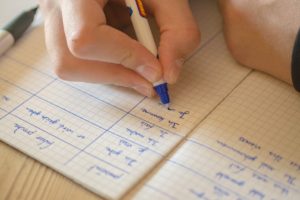Qu’est-ce que t’as dit ? The French Passé Composé
In this post we’ll talk about the French passé composé. This is the main tense used to speak about completed actions in the past. Its name means compound past, because it’s formed with two elements: an auxiliary (avoir or être) and the past participle of the main verb. First, we’ll look at which verbs use avoir and which ones use être in the past. Next, we’ll learn how to form past participles of regular verbs. After that we’ll see some examples of verbs that use avoir. Then we’ll see some verbs that use être. Finally, we’ll tackle the many common irregular past participles that you need to know.
Être or Avoir?
Most verbs use avoir as the auxiliary in the past tense. A few important ones use être, and these are all basically verbs of motion or a change of state, for example aller (to go) arriver (to arrive), venir (to come), monter (to go up), descendre (to go down), naître (to be born), mourir (to die). All reflexive verbs (s’appeler, to be called; se doucher, to take a shower, etc.) use être as well. We’ll come back to être, and for now we’ll focus on avoir.
Regular Past Participles
The part participle is the French equivalent of verb forms like spoken, gone, or seen. With regular verbs, it’s simple to form the past participle.
- –er verbs
replace –er with –é
parler > parlé - –ir verbs
replace –ir with –i
finir > fini - –re verbs
replace –re with –u
répondre > répondu
Avoir
Once you have the past participle, just use the form of avoir that agrees with your subject.
j’ai nous avons
tu as vous avez
il/elle/on a ils/elles ont
For example :
- Je parle avec un ami. (I speak with a friend.)
J’ai parlé avec un ami. (I spoke with a friend.) - Nous finissons à midi. (We finish at noon.)
Nous avons fini à midi. (We finished at noon.) - Elle répond au téléphone. (She answers the phone.)
Elle a répondu au téléphone. (She answered the telephone.)
Practice 1
Try that out. Change each of these sentences from the present to the passé composé.
- Je mange un croissant.
- Il étudie le français.
- Nous parlons tous les jours.
- Elle travaille dans un bureau.
- Mes amis jouent au tennis.
- Je prépare quelque chose à manger.
- Vous écoutez de la musique.
- Tu achètes un nouveau pantalon.
Être
Remember that many verbs that refer to movement or a change of state take être as a past tense auxiliary instead of avoir. These include aller/allé (to go/gone) arriver/arrivé (to arrive/arrived), venir/venu (to come/come) as well as devenir (to become) and revenir (to come back), entrer/entré (to go in/gone in) as well as rentrer (to come home/go back in), retourner/retourné (to return/returned), partir/parti (to leave/left), sortir/sorti (to go out/gone out), rester/resté (to stay/stayed), tomber/tombé (to fall/fallen), monter/monté (to go up/gone up), descendre/descendu (to go down/gone down), passer/passé (to pass), naître/né (to be born/born), mourir/mort (to die/died). All reflexive verbs (s’appeler, to be called; se doucher, to take a shower; se coucher, to go to bed; etc.) take être as well.
The only other thing to remember about these verbs is that the past participle agrees with the subject, taking the familiar adjective endings –e, –s, –es. Most of the time in speech you won’t hear this, of course, because this usually doesn’t change the pronunciation. One noteable exception is: il est mort (he died) and elle est morte (she died.)
- Marc est parti. (Marc (has) left.)
Marie est partie. (Marie (has) left.)
Marc et Robert sont partis. (Marc and Robert (have) left.)
Rita et Caroline sont parties. (Rita and Caroline (have) left.) - Marc s’est couché. (Marc went to bed.)
Marie s’est couchée. (Marie went to bed.)
Marc et Robert se sont couchés. (Marc and Robert went to bed.)
Rita et Caroline se sont couchées. (Rita and Caroline went to bed.)
Irregular Past Participles
French has a lot of irregular past participles – just as English does – and they tend to be the really common verbs. Here are the most common ones you’re likely to need, and we’ll divide them into small groups.
The Super Common Ones
Here are the most common verbs with irregular past participles. They don’t follow any particular pattern, but you’ll hear and use them a lot.
avoir (to have): eu
boire (to drink): bu
dire (to say): dit
écrire (to write): écrit
être (to be): été
faire (to do; to make): fait
lire (to read): lu
prendre (to take): pris
voir (to see): vu
- Tu as trop bu!
You drank too much ! - On a vu un très bon film.
We saw a very good film. - Qu’est-ce qu’elle a dit ?
What did she say ? - T’as fait quoi ce week-end ?
What did you do this weekend?
The Modals
Modals are verbs that combine with other verbs (in the infinitive) to express things like necessity, uncertainty, possibility, or permission. The three really common modals in French are devoir (have to, must), pouvoir (can, be able to), and vouloir (want). Their past participles all end in –u, but remember the circumflex on dû.
devoir (must, to have to): dû
pouvoir (can, to be able): pu
vouloir (to want): voulu
- J’ai voulu chercher un emploi.
I wanted to look for a job. - Nous n’avons pas pu y aller.
We weren’t able to go there.
Past Participles Ending in –is
Prendre (to take) could go in this group, but we put it in the first group since it’s so common. Verbs derived from prendre (apprendre, comprendre) all go here, as do mettre and verbs derived from mettre: promettre (to promise), admettre (to admit), remettre (to put back), and permettre (to permit).
apprendre (to learn): appris
comprendre (to understand): compris
asseoir (to sit): assis (être with s’asseoir)
mettre (to put): mis
permettre (to allow; to permit): permis
Normally, unless you’re seating someone else, you use s’asseoir, and since it’s reflexive, you use être as the auxiliary in the passé composé.
- Je me suis assis à côté d’elle.
I sat next to her. - Il n’a rien compris.
He didn’t understand anything. - Qu’est-ce qu’il a appris ?
What did he learn/find out?
Past Participles Ending in -i
The ending -i is the past participial ending of regular –ir verbs: finir: fini, obéir: obéi, etc. Two common irregular verbs have the same ending in the past participle.
rire (to laugh): ri
suivre (to follow): suivi
- J’ai suivi un cours d’anglais.
I took an English course. - On a beaucoup ri.
We laughed a lot.
Past Participles Ending in –u
A lot of pretty common verbs have irregular past participles ending in –u. Remember boire (to drink), lire (to read) and voir (to see) from the super common group.
connaître (to know, to be familiar with): connu
croire (to believe): cru
courir (to run): couru
décevoir (to disappoint): déçu
descendre (to go down) descendu (être)
falloir (to have to): fallu
obtenir (to obtain): obtenu
plaire (to please): plu
pleuvoir (to rain): plu
recevoir (to get, to receive): reçu
savoir (to know a fact): su
tenir (to hold): tenu
vivre (to live): vécu
valoir (to be worth): valu
- J’ai vécu en Allemagne.
I lived in Germany. - Ça m’a beaucoup plu.
I liked it a lot. - Tu n’as pas reçu mon message ?
You didn’t get my message?
Past Participles Ending in –uit
Verbs whose infinitives end in –uire have irregular past participles ending in –uit.
conduire (to drive): conduit
construire (to build): construit
cuire (to cook): cuit
détruire (to destroy): détruit
produire (to produce): produit
réduire (to reduce): réduit
traduire (to translate): traduit
- Qui a traduit ce livre ?
Who translated this book? - On a beaucoup conduit aujourd’hui.
We drove a lot today.
Past Participles Ending in –t
Here are some common verbs with irregular past participles ending in –t.
atteindre (to attain): atteint
couvrir (to cover): couvert
craindre (to fear): craint
découvrir (to discover): découvert
offrir (to offer): offert
ouvrir (to open): ouvert
- C’est moi qui ai ouvert la porte.
I’m the one who opened the door. - Ils n’ont pas encore découvert cet auteur.
They haven’t discovered this author yet.
Life or Death
The verbs mourir (to die) and naître (to be born) have irregular past participles that don’t quite fit anywhere else. They also both take être in the passé composé.
mourir (to die): mort(e) (être)
naître (to be born): né(e) (être)
- Où est-elle née?
Where was she born? - Son grand-père est mort hier soir.
Her grandfather died last night.
Notice that with elle, the past participle is née. Past participles of verbs that take être in the passé composé agree with their subjects, like adjectives.
Practice 2
Let’s practice some of the irregular past participles. Change each of these sentences from the present to the passé composé.
- Je fais des courses.
- Elle écrit un e-mail.
- Nous disons la verité.
- Ils prennent le train.
- Je bois du café.
- Nous voyons nos amis.
- Je lis un article.
- Je ne peux pas y aller.
- Vous ne comprenez pas cette histoire.
- Je mets un manteau avant de sortir.
- Nous suivons un bon cours.
- Tu le crois ?
- Le film me plaît.
- Nous vivons ensemble.
- Je reçois des textos de mes amis.
- Ils produisent beaucoup de vin ici.
- Je t’offre un café.
- Ils ouvrent à quelle heure ?
Get on the road to speaking French with the Language Garage!
We hope you’ve enjoyed learning about French passé composé. If you’d like to learn more:
- Create a free Language Garage account to access tons of French vocabulary, grammar, and culture.
- Follow us on Facebook, LinkedIn, BlueSky, Twitter, Threads, Instagram, or Pinterest. We publish lots of French vocabulary, grammar, and culture notes, so it’s a great way to pick up some new vocabulary and practice.
- Check out our other posts on French language, culture, and more.
- Enroll in affordable, flexible, and personalized private online French lessons or sign up for a small group online French class.
Image by papagnoc from Pixabay.
Answers 1
- J’ai mangé un croissant. (I ate a croissant.)
- Il a étudié le français. (He studied French.)
- Nous avons parlé tous les jours. (We spoke every day.)
- Elle a travaillé dans un bureau. (She worked in an office.)
- Mes amis one joué au tennis. (My friends played tennis.)
- J’ai préparé quelque chose à manger. (I made something to eat.)
- Vous avez écouté de la musique. (You listened to music.)
- Tu as acheté un nouveau pantalon. (You bought new pants.)
Answers 2
- J’ai fait des courses. (I went grocery shopping.)
- Elle a écrit un e-mail. (She wrote an email.)
- Nous avons dit la verité. (We told the truth.)
- Ils ont pris le train. (They took the train.)
- J’ai bu du café. (I drank some coffee.)
- Nous avons vu nos amis. (We saw our friends.)
- J’ai lu un article. (I read an article.)
- Je n’ai pas pu y aller. (I wasn’t able to go there.)
- Vous n’avez pas compris pas cette histoire. (You didn’t understand this story.)
- J’ai mis un manteau avant de sortir. (I put on a coat before going out.)
- Nous avons suivi un bon cours. (We took a good course.)
- Tu l’as cru ? (You believed it/him?)
- Le film m’a plu. (I liked the film.)
- Nous avons vécu ensemble. (We lived together.)
- J’ai reçu des textos de mes amis. (I got some texts from my friends.)
- Ils ont produit beaucoup de vin ici. (The produced a lot of wine here.)
- Je t’ai offert un café. (I offered you/treated you to a coffee.)
- Ils ont ouvert à quelle heure ? (What time did they open?)






